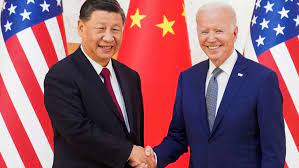
US-China Relation
US-China Relation
Important for Prelims:
US–China relations, Asia-Pacific Economic Cooperation Summit, US–Taiwan relations, Gallium, Germanium and Graphite, Military Maritime Advisory Academy, US–Taiwan Relations Act
Important for Mains:
GS-2: US-China relations, background, impact of US-China relations on India, way forward
11 December,2023
Why in News:
Recently, US President Joe Biden and Chinese President Xi Jinping met on November 15 in San Francisco, alongside the Asia-Pacific Economic Cooperation conference.
- The main objective of this meeting was to improve the strained bilateral relations, which are the most challenging since the establishment of diplomatic ties between the US and China in 1979.
Main outcomes of this summit:
- This led to the resumption of military-to-military communications between the two countries, which was necessary to resolve miscommunications between the nuclear-armed states.
- The communication channel was re-opened under the Military Maritime Advisory Academy from 1998.
- It was earlier closed in August 2022 after Nancy Pelosi's controversial visit to Taiwan.
Taiwan as a central issue between US & China
China's view on Taiwan:
- China, while advocating Taiwan's reunification with the mainland, views US actions as provocative.
- The "one-China" policy is accepted by Washington, which recognizes Beijing as the sole legitimate government of China but does not support Taiwan as part of China.
- The US also provides security guarantees to Taiwan under the Taiwan Relations Act.
China's reaction to Pelosi's visit:
- Beijing condemned Pelosi's visit, considering it a serious violation of the status quo.
- China responded to the USA with military exercises and ballistic missile firing near Taiwan.
- Recently, House Speaker Kevin McCarthy met Taiwan President Tsai Ing-wen in California.
US view on Taiwan:
- President Biden has indicated that the US would intervene if China attacked Taiwan.
Trade dispute between the two countries:
Trade Policy and Restrictions:
- America has imposed many restrictions on Chinese companies under its trade policy.
- President Biden continued and expanded policies initiated by the Trump administration, including blacklisting companies involved in the “Chinese military-industrial complex” and imposing controls on exports of advanced computer chips to China.
- In response, China banned exports of critical minerals such as gallium, germanium and graphite.
- China also tightened its anti-espionage and data protection laws, which impacted foreign companies operating in China.
Background of US-China relations:
- During the 19th century, American missionaries appeared to be nationalistic by showing sympathy towards China.
- During World War II, the United States supported the Chinese Nationalists in their fight against the Japanese occupation.
- The US tried to isolate China since 1949 when the Communists took over from the Nationalists.
- In the 1970s, the United States and Communist China showed solidarity to counter the Soviet Union.
- Economic relations between the two countries began in the 1980s, growing into a major commercial and technological partnership by the 1990s.
- During the 21st century, some people in America began to view China as a potential threat.
- The United States believed that China's growing economic prosperity would inevitably lead to greater democratization of its society.
- In the last two years, the rivalry between America and China has intensified due to reasons like trade, technology and naval activities in the South China Sea.
Significance:
- The ongoing bilateral disputes between the two countries will be resolved.
- This will lead to relaxation in the policy of global polarization.
- Instead of 'separation' between the two countries, new practical paths for co-existence will be paved.
- This meeting will bring more stability in bilateral relations.
- The US's three-pillar approach towards China – “Invest, Align, Compete” – will be affected.
Impact of US-China relations on India:
- India's approach towards US-China relations is multidimensional.
- Amidst these global changes, India finds itself in a complex situation. It faces persistent border tensions with China, exemplified by the Galwan Valley conflict in 2020. The changing dynamics of US-China relations may affect India's approach towards its northern neighbour.
- However, the apparent change in the US approach, moving from a more aggressive stance to “de-risking” its economic ties with China and resuming high-level confidence-building talks, is a subtle move in dealing with Beijing. indicates strategy.
- This change is based on the substantial economic engagement between the two countries as bilateral trade was to reach approximately $700 billion in 2022.
Way forward:
- India must constantly assess changes in relations between the US, China and Russia so that India's dominance remains intact
- India's emphasis should be on strengthening its ties with the US and taking advantage of new opportunities to maintain its position.
- India needs to effectively address any sudden changes in US relations in the international system.
Conclusion:
- Recent alignments in Asia and the Indo-Pacific have prompted India and the US to consider further enhancing their ties, especially in view of China's growing assertiveness in the region.
- The Indo-Pacific region has been a high priority region for the US, and the US is challenging China's hegemonic claims to the region and mobilizing alliances to counterbalance China's influence.
Source: The Hindu
------------------------------------------------------
Mains Question
Discuss the impact of US-China relations on India's international interests in the current scenario.